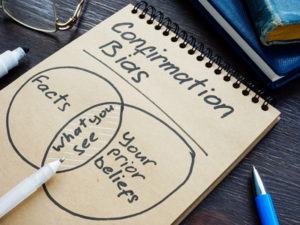 Confirmation bias is a psychological phenomenon which is at least partially responsibly for numerous things in modern society. Whether it be Brexit or the election of Donald Trump, those responsible for such outcomes tended to ignore anything that disagreed with their opinion and only listen to the things that confirmed the bias that they already held. The idea of ‘ignoring experts’ falls into this bracket, as does living in the ‘post-truth’ era.
Confirmation bias is a psychological phenomenon which is at least partially responsibly for numerous things in modern society. Whether it be Brexit or the election of Donald Trump, those responsible for such outcomes tended to ignore anything that disagreed with their opinion and only listen to the things that confirmed the bias that they already held. The idea of ‘ignoring experts’ falls into this bracket, as does living in the ‘post-truth’ era.
Everyone likes to have their opinions confirmed, so it’s little wonder that confirmation bias is something that the vast majority of people are guilty of falling into. When it comes to betting, we will often look to the data that supports our theory about a bet and ignore any data that contradicts it. We have our own biases confirmed and don’t pay any attention to anything that might make us re-think our position, which can be dangerous thinking.
What Is Confirmation Bias?
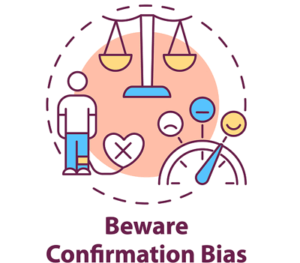 Simply put, confirmation bias is when people will interpret information in a manner that supports beliefs that they already held. It can involve favouring a certain type of information, only recalling things that agree with us and actively searching out something that ‘proves’ what we already believe or a value that we hold, but the important thing is that it involves confirming our own biases rather than exploring other opinions.
Simply put, confirmation bias is when people will interpret information in a manner that supports beliefs that they already held. It can involve favouring a certain type of information, only recalling things that agree with us and actively searching out something that ‘proves’ what we already believe or a value that we hold, but the important thing is that it involves confirming our own biases rather than exploring other opinions.
The reality is that confirmation bias is actually a broad church, covering numerous different explanations. The thing that matters is that the person involved is being selective in what they consider to be important, choosing only the things that they agree with. Another name for confirmation bias is myside bias, which perhaps better explains what it means: people that only want information that agrees with their side of an argument.
Perhaps the best way of understanding confirmation bias is by exploring the world of social media. People tend to use a platform like Twitter to follow like-minded others, rarely seeking out those that offer an alternative point of view. The result of this can often be that users are in a ‘bubble’, whereby they only read opinions that echo their own thoughts. They think that this means that everyone agrees with them.
When someone then leaves this ‘bubble’, perhaps by interacting with someone outside of it on social media or by having a discussion with a real person, they discover that their opinion isn’t actually that widely held. Elections often show this up, with many left-wing people believing that they left-leaning parties are doing well because all they read on Twitter are left-wing opinions, only for the right-wing party to win by a comfortable margin.
How It Can Affect Your Bets

Knowing what confirmation bias is is all well and good, but how might it affect the bets that you place? Most of us prefer to stick with what we know rather than change what we think to be true because of new evidence. As a result, any new evidence that is presented to us is dismissed using a number of cognitive methods, which typically involve coming up with excuses and reasons for why that piece of information is false.
Think of your favourite football team. You might be thinking of placing a bet on them this weekend, believing that they have the ability to win the match that they are playing in. When you are confronted with evidence that they lost the previous five matches against the same opposition, you being to justify each of the defeats in question. A refereeing mistake caused one loss, for example, whilst injuries were the reason for another.
Even though all of the stats point towards your team losing, you find a way to justify previous defeats and validate your opinion that your side will win this time around. You’ll then place a bet on your chosen team to win, which turns out to be a losing wager because the information that you ignored before kick-off in favour of flimsy evidence that supported your beliefs actually turned out to be true.
Let’s imagine a Manchester United supporter in the 1990s, absolutely convinced that the Red Devils were going to win the FA Cup. Eric Cantona has been on fire in the previous rounds of the competition, but he pulls his hamstring in the week building up to the final. Rather than question your opinion on United’s chances, you find different ways to justify your earlier assertion that they’d win it, ignoring anything that doesn’t agree with that.
We All Look For Patterns
 It is human instinct to seek out patterns and then use them when we’re trying to predict the future. This is not only natural but can also be quite helpful. The problem comes when we then use these patterns as definitive proof to support one theory and refuse to accept any other evidence. The most obvious example comes on the roulette table, when the ball landing in black a series of times means that we know it will be red soon.
It is human instinct to seek out patterns and then use them when we’re trying to predict the future. This is not only natural but can also be quite helpful. The problem comes when we then use these patterns as definitive proof to support one theory and refuse to accept any other evidence. The most obvious example comes on the roulette table, when the ball landing in black a series of times means that we know it will be red soon.
In actuality, the wheel is completely reset with every spin and there’s no reason the ball couldn’t land in black for the rest of our time in the casino. We ignore this because on previous occasions when the ball has landed in black for several successive spins it has then landed in red, plus this is something that makes the most logical sense to us as bettors. The problem is, gambling isn’t a logical pastime.
When Mohamed Salah arrived at Liverpool, many Premier League fans remembered his time at Chelsea when he was disappointing. Rather than considering whether he’d been given a fair crack of the whip at Stamford Bridge under José Mourinho, people instead decided that he wasn’t going to do very well in his second spell in the English top-flight, even though he’d been a top performer for Roma, the club Liverpool bought him from.
When Salah notched up 44 goals in all competitions during his debut campaign, many said that he was a ‘one-season wonder’. When he scored 27 in his second season and 23 in his third, the same people suggested it was more down to fortune than ability. Rather than acknowledge that Salah was a brilliant goalscorer, people decided that he was still ‘over-performing’ and ignored any evidence to the contrary.
How To Avoid Confirmation Bias In Betting
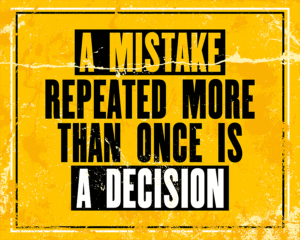 It’s important to work hard to avoid being caught in a period of confirmation bias if you want to be successful in betting. Many of us have bets that we like to place and can soon get stuck placing the same sort of bet over and over again, only remembering the times that it worked in our favour and ignoring when it went wrong. This includes using the same betting strategy over and over again, limiting the tools at our disposal.
It’s important to work hard to avoid being caught in a period of confirmation bias if you want to be successful in betting. Many of us have bets that we like to place and can soon get stuck placing the same sort of bet over and over again, only remembering the times that it worked in our favour and ignoring when it went wrong. This includes using the same betting strategy over and over again, limiting the tools at our disposal.
Imagine a time when you’ve placed five bets in succession on a specific outcome and all five bets have won. Rather than looking at why you placed the bet in the first place and why it was that they were all winners, many punters will continues to place the same type of bet even after it has stopped being a winning one. We ignore the fact that it has stopped winning and instead simply concentrate on those five winners.
Let’s say that you’re playing blackjack and you lose. You double your stake and lose again. You double your stake for a third time and win. The next time you sit down to play blackjack, you’ll remember the occasion that the luck eventually turned your way when your doubled your stake so you keep doing so again, only this time your luck doesn’t turn and you’ve wiped out your entire balance trying to win a modest sum.
It’s important to stop and think when we find ourselves in a position where the same strategy has seen us lose several times in a row. Is there something that we can do differently in order to break out of the same rut? Are we guilty of falling for a confirmation bias, rather than pausing for a second and thinking about what evidence there is for us to consider that goes against our pre-conceived idea?
Shared Confirmation Biases Affect Odds In Sports Betting
 The odds of a given sports market are often seen by punters as a reflection of the probability of that outcome occurring. That is true to a degree as odds traders and algorithms set odds based on stats and previous form.
The odds of a given sports market are often seen by punters as a reflection of the probability of that outcome occurring. That is true to a degree as odds traders and algorithms set odds based on stats and previous form.
Odds, however, are also affected by how many people back a given market and if lots of people are lumping money on one specific outcome those odds will shorten (and the opposing odds will lengthen), when in reality the probability of the outcomes haven’t changed. Bookies don’t really care what the odds are, they care about having a balanced book (equal proportion of bets on all outcomes) to ensure they make a profit.
Therefore, shared confirmation biases can affect odds and this is worth being aware of. Let’s take the example of a popular horse, say Tiger Roll, running in a race late its their career. In reality the horse is past its peak and close to retirement but there are plenty of people who have sentiment for the horse and remember it winning a lot in the past, perhaps they even won a lot of money on it when it won back-to-back Grand National races.
More money will be bet on Tiger Roll than horses with a comparable probability of winning, which will cause the odds to shorten. Here the shared confirmation bias means it looks like the horse has a better chance of winning than it does in reality. This can create a feedback loop, people see the odds shortening for Tiger Roll and therefore decide to back it in the belief that it must now have a much better chance of winning, which reinforces the whole thing.
Another example would be the Donald Trump election in 2016, where people were convinced by experts that he couldn’t win, leading to big odds by bookies. In reality people were seeing those expert opinions as confirmation of their own views.
Criticise Yourself
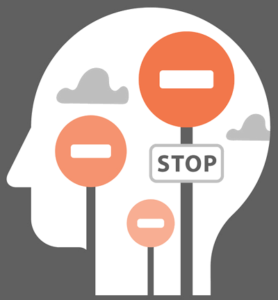 If you want to overcome the confirmation bias problem in your betting, the most important thing that you’ll want to do is become your own biggest critic. You need to constantly question your own decisions and make sure that you’re not making the same mistake over and over again. It’s really important that you do this with your bets regardless of whether they win or lose, evaluating why you placed the bet and why they turned out the way they did.
If you want to overcome the confirmation bias problem in your betting, the most important thing that you’ll want to do is become your own biggest critic. You need to constantly question your own decisions and make sure that you’re not making the same mistake over and over again. It’s really important that you do this with your bets regardless of whether they win or lose, evaluating why you placed the bet and why they turned out the way they did.
It’s really important to have a good sense of not only what is working in your betting but also what isn’t. As best as possible, remove any sense of prejudice that you might have when you’re looking to place bets. If necessary, you might want to consider whether you should place bets on the sports team that you support. Are you able to consider possible outcomes of matches and player performances objectively?
How Do You Use Information?
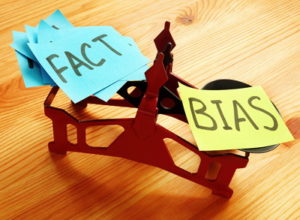 Another thing that you can do is to question whether there is any set of information that you tend to want to agree with. If there’s some information presented to you that disagrees with the theory that you already have in place, how do you react to it? If you’re trying to avoid falling into the trap around confirmation bias then you’ll want to make sure that you don’t simply dismiss this information out of hand.
Another thing that you can do is to question whether there is any set of information that you tend to want to agree with. If there’s some information presented to you that disagrees with the theory that you already have in place, how do you react to it? If you’re trying to avoid falling into the trap around confirmation bias then you’ll want to make sure that you don’t simply dismiss this information out of hand.
In the wake of knowing the result of your bet, think back to how you dealt with certain pieces of information. Did you ignore some but welcome others? If so, try to think about whether the information that you ignored disagreed with your bet selections and the information that you welcomed confirmed what you already thought. Even if your bet was a winner, this could tell you plenty that you can learn from moving forward.
Analyse Everything
 It really is crucial to analyse everything when you’re placing a bet. You must be thorough in your analysis, looking at every bet that you’ve placed and every piece of information that you had available to you. Do your best to ensure that your opinion forming is based around facts rather than what you think will happen, because if you don’t do this then even winning bets will be more down to good fortune than intelligent working out.
It really is crucial to analyse everything when you’re placing a bet. You must be thorough in your analysis, looking at every bet that you’ve placed and every piece of information that you had available to you. Do your best to ensure that your opinion forming is based around facts rather than what you think will happen, because if you don’t do this then even winning bets will be more down to good fortune than intelligent working out.
When you’re sitting down to make a bet, do some research attempting to actively disprove it being a winning bet. What information can you find that goes against your already pre-conceived idea? Those that watched Manchester United play in the 1990s and 2000s will be absolutely certain that they’re going to score a late goal in a match and will potential bet on that outcome In-Play, but what evidence is there that that happens in the modern era?
Don’t Ignore It Completely
 The contradiction when it comes to confirmation bias is that it shouldn’t be ignored completely. It’s really important to question and analyse your pre-conceived biases, but at the same time we also need to understand that in many cases we have them for a reason. The best bettors use a combination of research, facts and intuition when placing wagers, ensuring that they keep a note of which ones work out, which ones don’t and why.
The contradiction when it comes to confirmation bias is that it shouldn’t be ignored completely. It’s really important to question and analyse your pre-conceived biases, but at the same time we also need to understand that in many cases we have them for a reason. The best bettors use a combination of research, facts and intuition when placing wagers, ensuring that they keep a note of which ones work out, which ones don’t and why.
Confirmation bias is something that can lead to us losing a wealth of bets if we allow ourselves to ignore valid and important information as a result of it. However, it’s also something that can lead us towards a specific wager for a good reason. When you’re placing a bet, be guided about what to place by your biases, but only actually place the bet once you’ve done the research to ensure that it isn’t based on false information or ignoring important facts.
